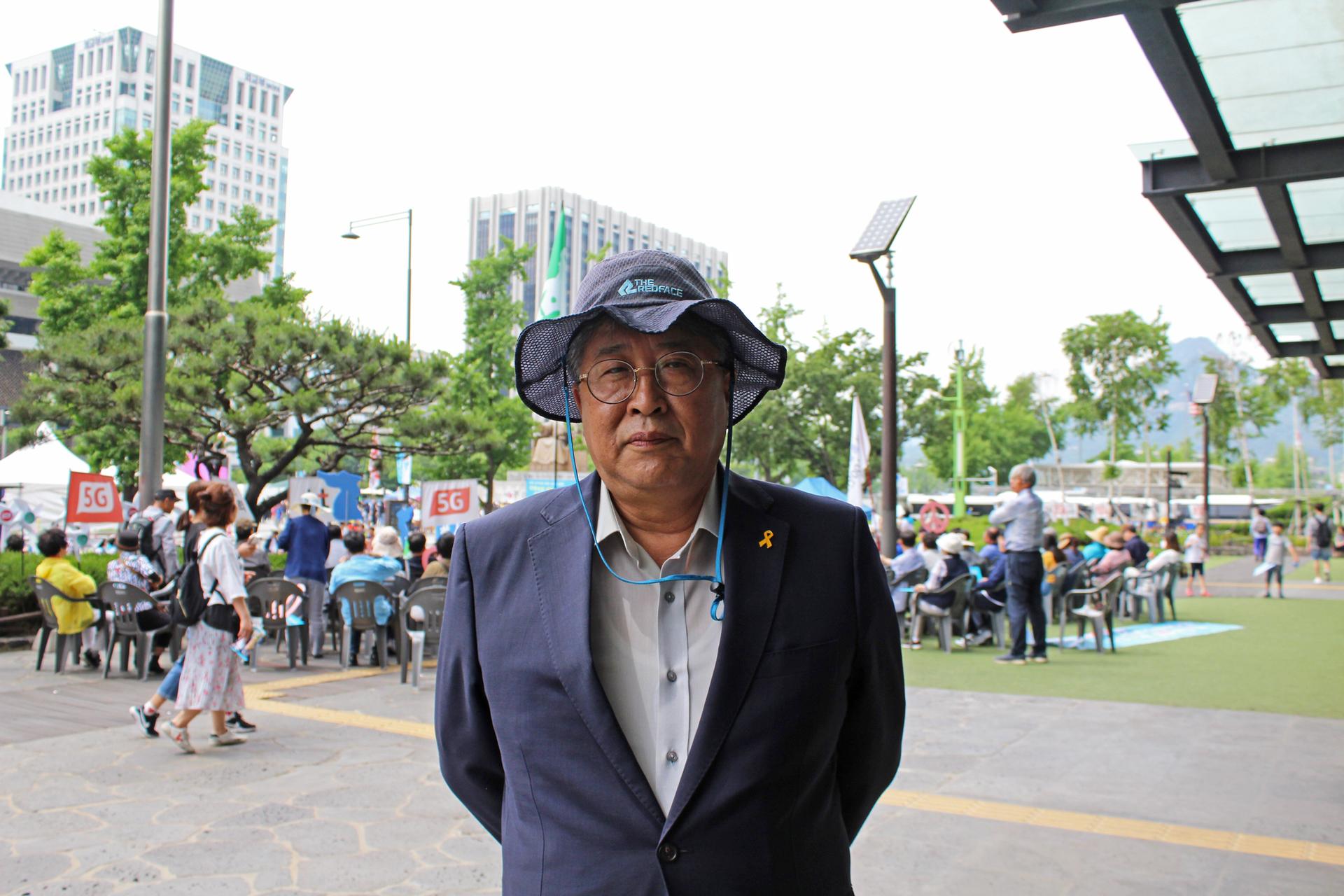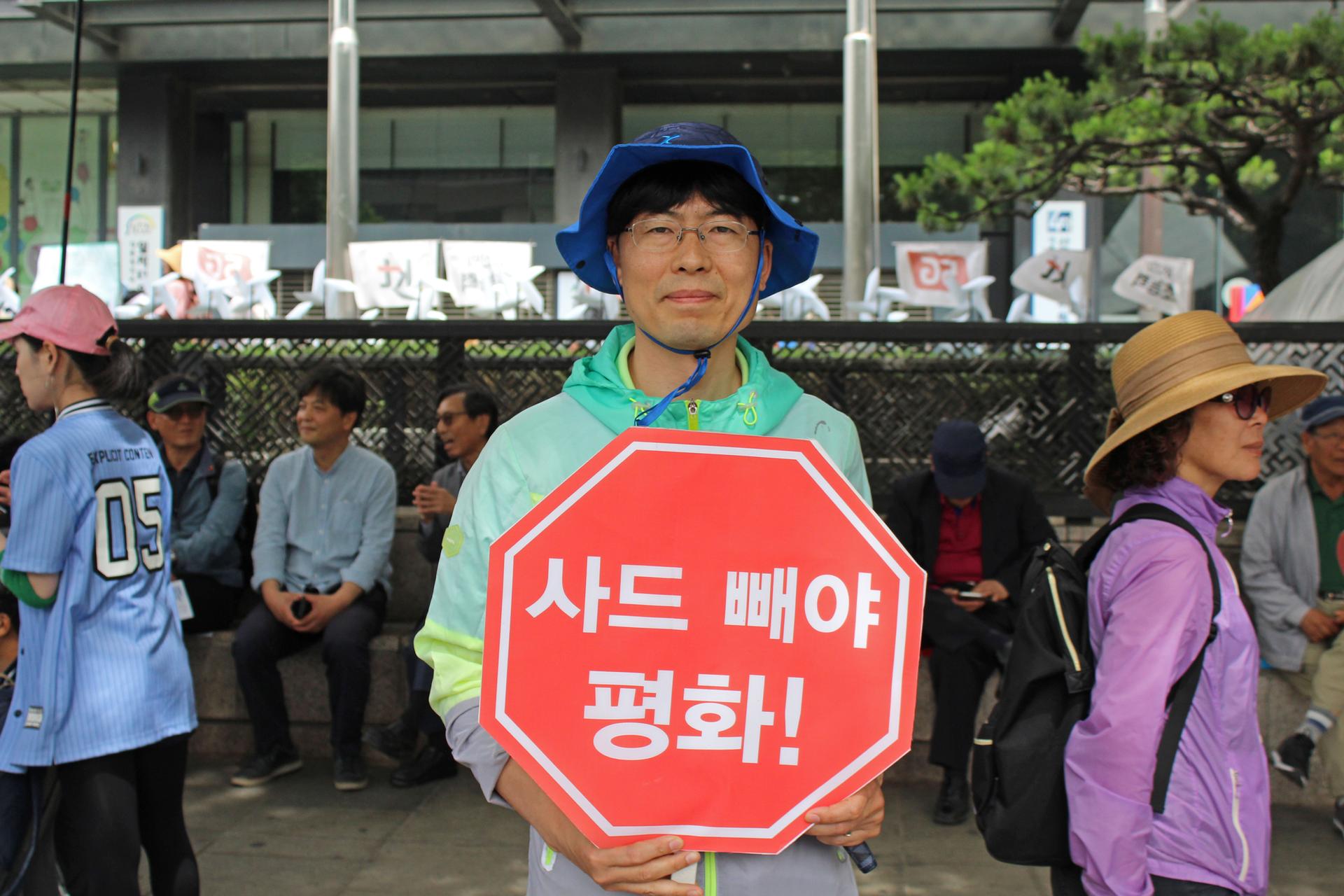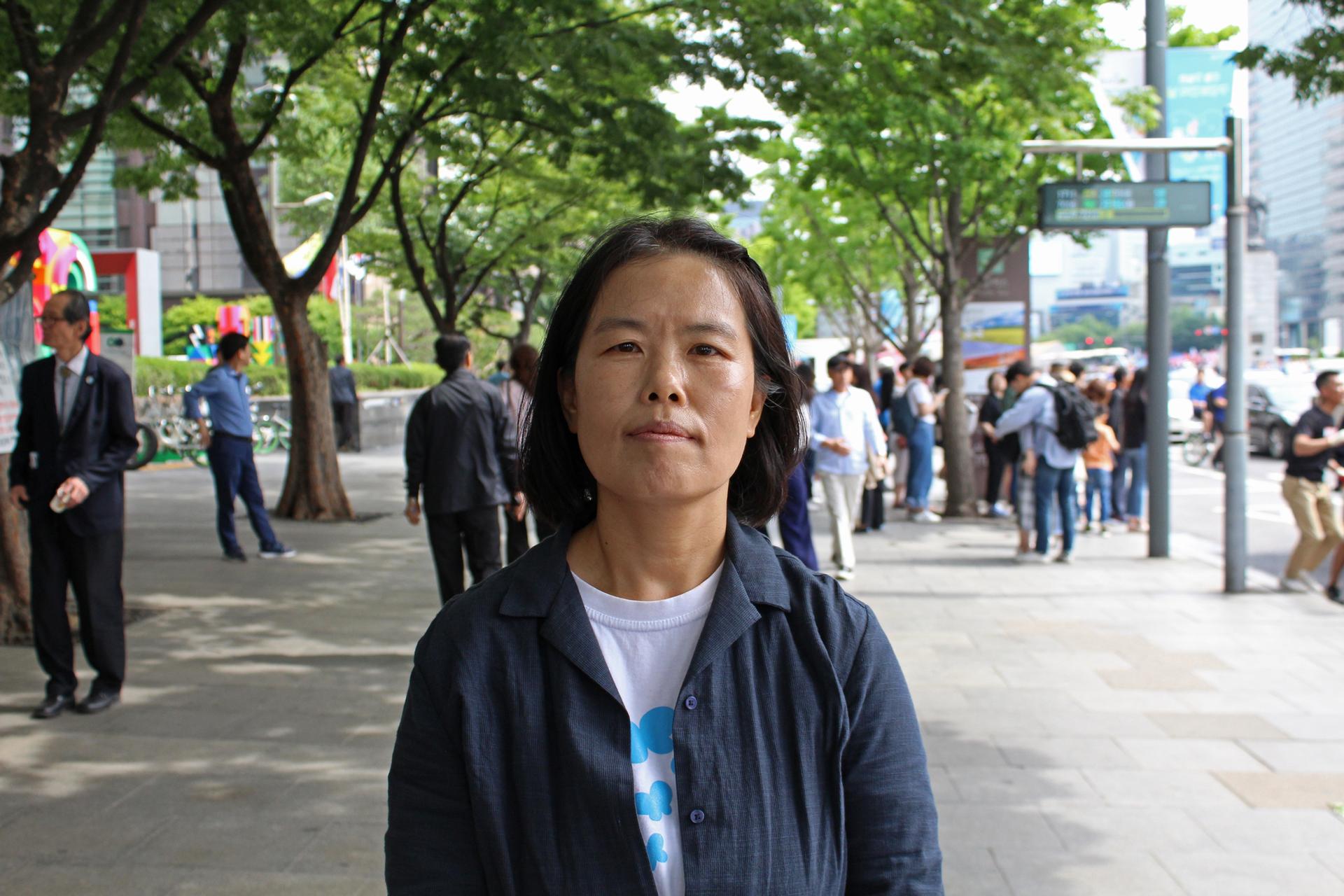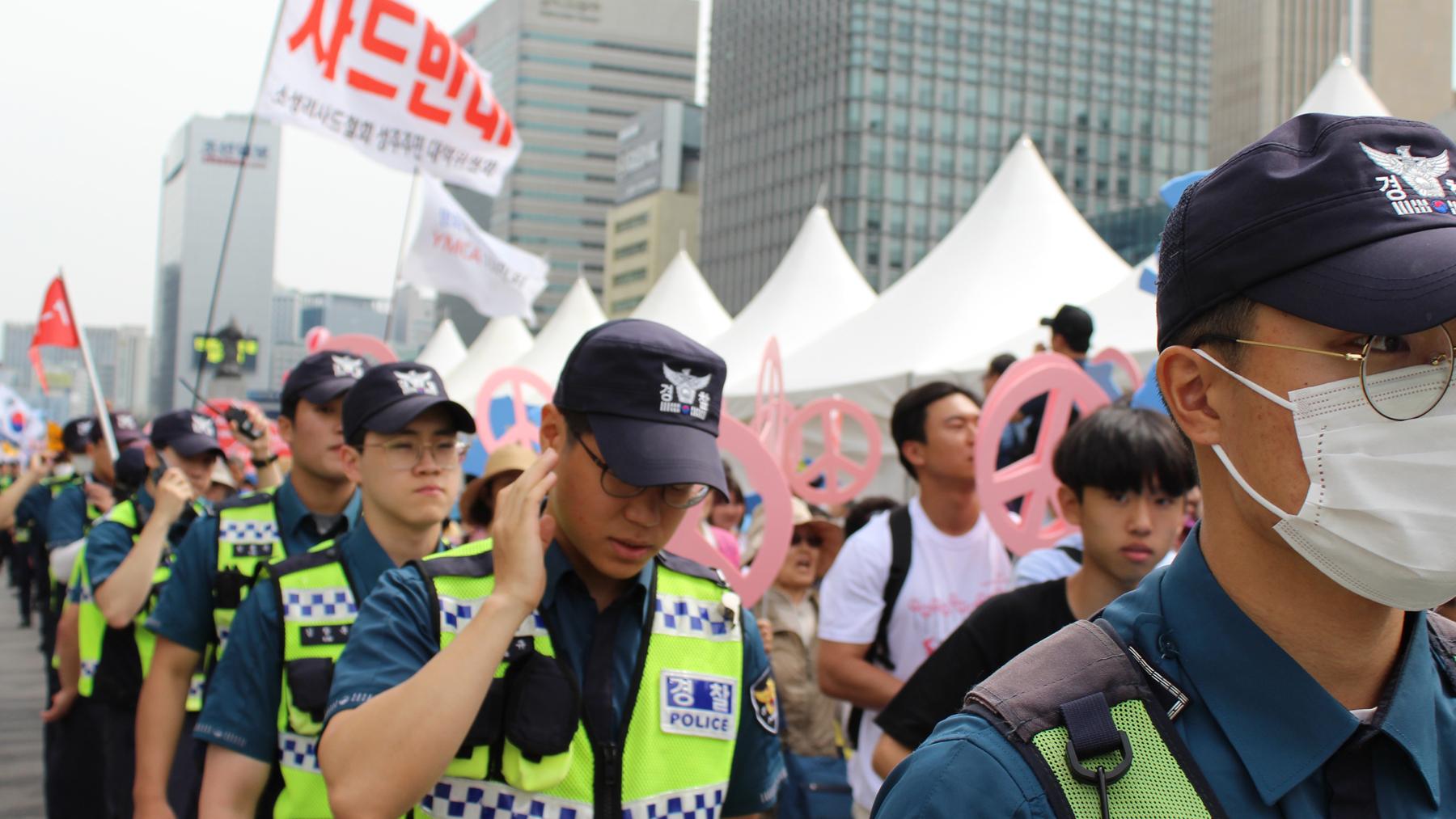South Korean aid to North Korea could be a game changer — if North Korea accepts it
Police walk along the sides of a parade of pro-peace demonstrators calling for the United States and North Korea to further engage, Seoul, South Korea, June 1, 2019.
Standing outside of the US embassy in Seoul, South Korea, with hundreds of other protesters, 64-year-old Pastor Kim Jong-su nodded solemnly as he spoke about hunger in North Korea.
“Still, there are people here whose parents are in the North,” he said on June 1, at an organized protest calling for more diplomatic engagement between the US and North Korea.
“Of course, many of them are dying now, but we — North and South Korea — are still brothers. At the very least, humanitarian aid should be done, otherwise there will be no peace on our peninsula.”
“Of course, many of them are dying now, but we — North and South Korea — are still brothers. At the very least, humanitarian aid should be done, otherwise there will be no peace on our peninsula.”
Related: North Korea fires two short-range missiles in second test in a week
Pastor Kim is part of the roughly 45% of South Koreans who believe the government should send food to North Korea in response to its largest-ever projected food crisis — despite Kim Jong-un’s recent short-range missile test provocations.

A recent report from the United Nations World Food Program estimated that 40% of North Korea’s population (about 10.1 million people) are “in urgent need of food assistance” due to dry spells, floods and economic sanctions this year, and the problem could get even worse.
“The situation [in North Korea] could further deteriorate during the lean season from May to September if no proper and urgent humanitarian actions are taken.”
“The situation could further deteriorate during the lean season from May to September if no proper and urgent humanitarian actions are taken,” the report stated.
Now, South Korean President Moon Jae-in has pledged to send about $8 million in humanitarian aid to the North, according to a May 23 announcement from the Korean Ministry of Unification. The package — mostly food assistance and medical supplies — was meant to be donated in 2017, but was ultimately delayed after North Korea sent a ballistic missile flying near Japan. Currently, there’s no exact timeline for the aid’s delivery, but hunger in North Korea is projected to get worse starting in July.
South Korea’s aid could certainly push the stalled diplomatic talks forward after US President Donald Trump walked away from his face-to-face negotiations with Kim Jong-un in Vietnam last February.
There’s only one snag: So far, North Korea hasn’t accepted it.
“Eight million dollars is kind of laughable. In the long run, the package is too small. … It’s kind of insulting, and I think South Korea knows that.”
“Eight million dollars is kind of laughable. In the long run, the package is too small,” said C. Harrison Kim, a professor at the University of Hawaii at Manoa and author of “Heroes and Toilers: Work as Life in Postwar North Korea.” “It’s kind of insulting, and I think South Korea knows that,” Kim said.
Related: The surprising life of a student at a North Korean university
The politics of aid
Both President Donald Trump and South Korean President Moon Jae-in support the idea of sending humanitarian aid to North Korea, especially as it faces a 1.36 million-ton grain shortage (its worst harvest in a decade). However, the majority of South Koreans seem less than enthusiastic about the aid plan — and ironically, the same goes for Kim Jong-un.
That’s probably because North Korea wants more than what’s being offered, according to experts.
“I think the North is willing to accept some food aid, but it all depends on the amount of aid and when it’s given … $8 million may seem like a lot of money, but there might be one of the largest famines since the 1990s on the horizon.”
“North Korea is a sophisticated negotiating state, and so when South Korea says $8 million, North Korea understands that’s the starting point and the number can go up,” said Jasper Kim, a professor at the Graduate School of International Studies at Ewha Woman’s University in Seoul. “I think the North is willing to accept some food aid, but it all depends on the amount of aid and when it’s given … $8 million may seem like a lot of money, but there might be one of the largest famines since the 1990s on the horizon.”
North Korea might also be rebuffing aid offers out of resentment, or for fear that the extra food comes with strings attached.
After all, in recent years, the United States and the United Nations have dealt with North Korea’s missile provocations by stacking up economic sanctions against the country. The idea was that North Korea would be pressured to denuclearize out of economic desperation.
Now, analysts are beginning to grapple with the reality that these same sanctions could be contributing to food shortages for average North Koreans — especially since fertilizer, farming equipment and fuel are all sanctioned items. As the report from the UN World Food Program put it, “The unintended negative impact sanctions can have on agricultural production, through both direct and indirect impacts, cannot be ignored.”
“… the aid coming from South Korea symbolizes ongoing measures to force North Korea to change or convincing North Korea through punishment. It’s not a carrot, right? It’s actually a stick.”
“I think the biggest reason [for refusing aid] is the sanctions because North Korea believes sanctions are the major cause of the country’s economic problems,” said C. Harrison Kim. “So, in this situation, the aid coming from South Korea symbolizes ongoing measures to force North Korea to change or convincing North Korea through punishment. It’s not a carrot, right? It’s actually a stick.”
Related: Should the US lift sanctions against North Korea already?
What Koreans want
South Korea is split between those who believe in engagement with North Korea and those who vehemently oppose it. But for those who desperately want progress between the two nations, aid seems like a basic human right — let alone one of President Moon Jae-in’s only options for moving forward.

“Of course, we should provide food aid. We are all one nation,” agreed Kim Jong-hee, a 52-year-old Seoul resident who identifies as a housewife. “I believe that food is the most basic human right, and it should be separated from all political warfare.”

Many promises have been made since North and South Korea met during the 2018 Pyeongchang Winter Olympics — for the first time in years — but few have been fulfilled. North Korea has repatriated Korean War remains to the United States, demolished a key missile-engine testing site and removed landmines as well as guard posts along the Demilitarized Zone.
The United States, however, has provided virtually nothing in concessions other than face-to-face meetings with Trump. Meanwhile, South Korea has been unable to reopen Kaesong Industrial Complex or build highly anticipated inter-Korean railroads as promised, since these actions would violate economic sanctions.
Related: US guarantees unlikely to prompt North Korea to de-nuclearize
“The question is, ‘Who really needs this aid more?’” Jasper Kim said. “Part of Moon Jae-in’s platform is trying to reconcile relations with the North very publicly, and North Korea knows that.”
The future?
There’s a disconnect between what North Korea really wants and what it’s getting. But even so, food aid to North Korea could be a serious step forward for stalled inter-Korean relations — so long as North Korea comes around to accepting it.
“This absolutely could be a game changer,” C. Harrison Kim said. “It’s still very important that [this aid package] happens because North Korea has taken several concrete measures, but we haven’t really seen any concrete steps forward yet. It’s about, basically, putting the money where the mouth is, and that has not happened.”
Humanitarian aid would ultimately stop some North Koreans from going hungry this summer. Better yet, it could be a proof of concept for further inter-Korean engagement in the future.
“It’s a lot easier to do it this way than any kind of official trade, and this could be an opportunity for the two countries to find a way to economically engage with each other,” C. Harrison Kim added. “This could be a first step — a kind of experiment — in how to move money between the two countries while following the rules of the UN.”
Our coverage reaches millions each week, but only a small fraction of listeners contribute to sustain our program. We still need 224 more people to donate $100 or $10/monthly to unlock our $67,000 match. Will you help us get there today?
